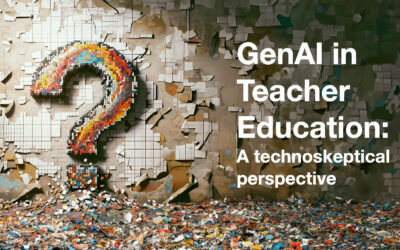We recently celebrated 100 episodes of Silver Lining for Learning (see the 100th episode or read my blog post about the journey). In this process we have had an opportunity to speak with some amazing people – educational leaders, innovators, administrators, deans, researchers, students and more. These conversations have touched on a wide array of topics, including but not limited to: student autonomy, remote learning, novel learning organizations, pioneering curricula and programs, innovative ways of teaching, new approaches to education policy, ground-breaking technological inventions and more. Our guests have come from all over the world: Italy, Indonesia, India, the Philippines, Bhutan, Canada, Argentina, Australia, Korea, Israel, Malaysia, Nepal, Spain, England, Costa Rica, Thailand (to list a few) and of course the US. And we now have over 100 hours of original programming (available for free through the website).
We, as hosts, have also learned a lot over these past two years and we had an opportunity to write about some of what we have learned and observed. This article was recently published. Below you can find the complete reference, link to the article as well as the abstract.
Dede, C., Zhao, Y., Mishra, P., & Bonk, C. J. (2021). The Silver lining for learning webcasts as a bottom-up driver of global educational innovation. Journal of Digital Politics, 1(3), 523-542.
Abstract:
Silver lining for learning (Sll: silverliningforlearning.org) is an unfunded, unsponsored, bottom-up initiative that emerged as a direct result of the pandemic. The authors are part of a team that co-founded this series of weekly webcasts (starting mid-March 2020), with close to 100 episodes as of March 2022. As the website describes, Sll «is an ongoing conversation on the future of learning» with innovative educators and education leaders from across the globe. The demands of 21st century work, citizenship, and life require a transformation of instruction to foster a very different set of knowledge, skills, and dispositions than those mandated by current national and regional educational governance systems focused on outdated educational goals and methods. This article describes representative Sll episodes and highlights the grassroots innovations that have been featured in them. The episodes on Sll have highlighted bottom-up models for trans- formative innovation that complement top-down initiatives for incremental educational improve- ment in industrial-era schooling. Regional, national, and global policies and reports have some value, but their recommendations lack detail about specific models for educational transforma- tion in which participants experience ownership, cultural relevance, and contextual alignment. These bottom-up cases of innovation have been selected to illustrate educational transformation, particularly those involving digital forms of learning, design, and technology. Sections in this article on Student autonomy and Self-determination, Communities of learners, and Educational creativity and Innovation highlight a range of perspectives on innovation from the co-hosts. The creative tensions among these perspectives drive rich dialogues that help to make the show evocative for new models and methods. Sll demonstrates that, with almost no resources, locally led but globally motivated innovations can be recognized, celebrated, and shared across the world.




0 Comments